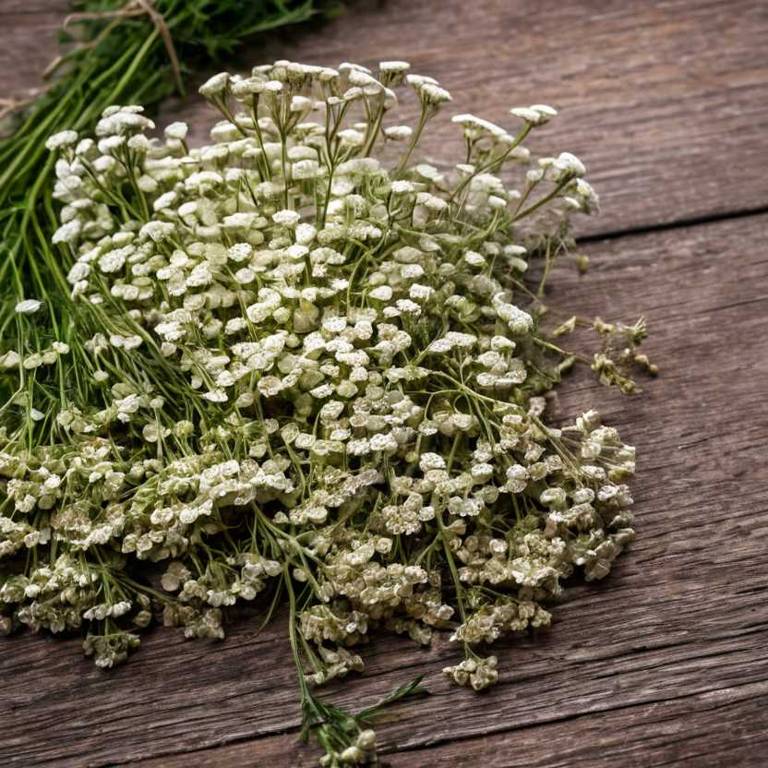By Leen Randell
Updated: Jul 06, 2024
10 Health Benefits Of Achillea Millefolium (Yarrow)

Achillea millefolium, also known as yarrow, has health benefits such as reducing inflammation, fighting off infections, and aiding in wound healing due to its antiseptic, anti-inflammatory, and antiviral properties.
These benefits can improve people's lives by reducing pain and discomfort from arthritis and other inflammatory conditions, preventing illness from infections, and promoting faster recovery from injuries.
Many herbalists and natural health practitioners use yarrow in teas, tinctures, and salves to support overall well-being.
This article explains in details the 10 best health benefits of Achillea millefolium.
1. Reduces inflammation
Achillea millefolium reduces inflammation because of its unique composition and properties.
Its leaves and flowers contain a mixture of flavonoids, phenolic acids, and sesquiterpenes, which have potent anti-inflammatory activities. These compounds inhibit the production of pro-inflammatory enzymes, cytokines, and other chemical mediators that contribute to inflammation, thereby reducing swelling, pain, and redness in the affected area.
This natural ability to combat inflammation has made yarrow a popular herbal remedy for centuries.
2. Stops excessive bleeding
Achillea millefolium stops excessive bleeding because of its unique ability to contract blood vessels and stimulate platelet production.
The plant's essential oils, particularly thymol and sesquiterpenes, have been shown to promote clotting and reduce bleeding time by constricting blood vessels and inhibiting the production of prostaglandins, which can dilate blood vessels and prolong bleeding.
This natural hemostatic effect makes yarrow a trusted remedy for stopping cuts, wounds, and nosebleeds.
3. Eases muscle spasms
Achillea millefolium eases muscle spasms because of its ability to relax muscles and reduce inflammation.
The herb contains a compound called apigenin, which binds to specific receptors in the brain, promoting relaxation and reducing muscle contractions. Additionally, yarrow's anti-inflammatory properties help to reduce swelling and pain associated with muscle spasms, providing relief from cramps, knots, and stiffness.
This natural remedy is often used topically or taken as a tea to alleviate muscle tension and promote overall well-being.
4. Alleviates menstrual cramps
Achillea millefolium alleviates menstrual cramps because of its natural anti-inflammatory and analgesic properties.
The plant's active compounds, such as sesquiterpenes and flavonoids, work to reduce prostaglandins, hormone-like substances that cause uterine contractions and pain. Additionally, yarrow has been shown to relax the uterine muscles, reducing cramp severity and duration.
This natural remedy provides a safe and effective alternative to over-the-counter medications, offering relief from menstrual discomfort without harsh side effects.
5. Improves digestion
Achillea millefolium improves digestion because of its unique composition and traditional uses.
The plant contains a variety of bioactive compounds, including flavonoids, phenolic acids, and terpenes, which have been shown to have anti-inflammatory properties and enhance digestive enzymes.
Yarrow has been used for centuries in herbal medicine to soothe digestive issues such as bloating, cramps, and diarrhea, making it a natural remedy for promoting healthy digestion and alleviating symptoms of irritable bowel syndrome (IBS).
6. Reduces fever
Achillea millefolium reduces fever because of its ability to stimulate sweating and promote the elimination of toxins from the body.
The plant's bioactive compounds, including flavonoids and polyacetylenes, have anti-inflammatory and antipyretic properties, which help to reduce inflammation and alleviate fever symptoms.
Additionally, yarrow's diaphoretic effects can help to break a fever by inducing sweating and clearing the body of heat.
7. Soothes skin irritations
Achillea millefolium soothes skin irritations because of its anti-inflammatory and antiseptic properties.
The plant's leaves and flowers contain a compound called sesquiterpenes, which have been shown to reduce redness, swelling, and itching associated with skin irritations such as eczema, acne, and bug bites.
Additionally, yarrow's antimicrobial properties help to prevent infection and promote wound healing, making it an effective natural remedy for soothing and calming the skin.
8. Acts as a diuretic
Achillea millefolium acts as a diuretic because it contains flavonoids and phenolic acids that stimulate the kidneys to increase urine production.
When consumed, these compounds help to relax the muscles in the urinary tract, allowing for more efficient waste removal from the body.
This increased urine flow helps to flush out toxins, excess fluids, and waste products, making yarrow a natural remedy for edema, bloating, and other conditions where fluid retention is a concern.
9. Boosts immune system
Achillea millefolium boosts immune system because it contains flavonoids and phenolic acids that possess potent antimicrobial and antioxidant properties.
These compounds work synergistically to stimulate the production of white blood cells, which fight off invading pathogens, and modulate the immune response to reduce inflammation and oxidative stress.
Additionally, yarrow's bioactive constituents have been shown to inhibit the growth of certain microorganisms, further enhancing its immunomodulatory effects.
10. Relieves cold and flu symptoms
Achillea millefolium relieves cold and flu symptoms because of its potent antiviral and anti-inflammatory properties.
The plant's leaves and flowers contain flavonoids, which have been shown to inhibit the replication of viruses, reducing the severity and duration of infections. Additionally, yarrow's sesquiterpenes help to alleviate congestion, coughing, and fever by reducing inflammation in the respiratory tract.
As a natural expectorant, yarrow also helps to loosen and clear mucus from the lungs, making it an effective herbal remedy for colds and flu.